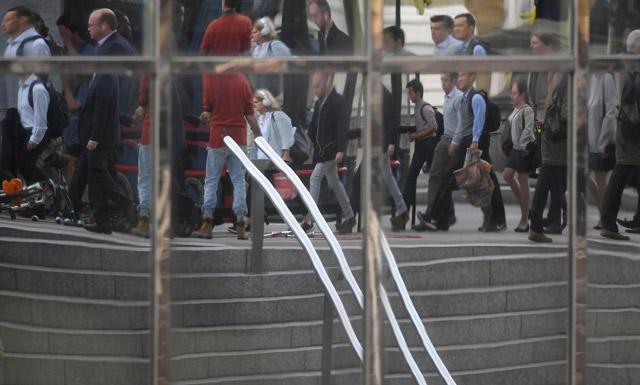You are here
British unemployment hits 41-year low
By AFP - Mar 15,2017 - Last updated at Mar 15,2017

Morning commuters walk across London Bridge with Tower Bridge in the background into the city of London on March 2 (AFP photo)
LONDON — Britain's unemployment rate has struck the lowest level for more than 41 years, official data showed on Wednesday as the country prepares to trigger its exit from the EU.
However a drop in the jobless rate comes alongside news of slowing wages growth.
Unemployment for the quarter ending January 31 fell to 4.7 per cent from a rate of 4.8 per cent in the final three months of 2016, the Office for National Statistics said in a statement.
"The unemployment rate dropped to 4.7 per cent in the three months to January 2017... It has not been lower since June to August 1975," the ONS said.
Analysts' consensus forecast had been for an unchanged rate of 4.8 per cent, which would have kept unemployment at an 11-year low point.
"The labour market is currently seeing decent improvement, reflecting the economy's resilience through the second half of 2016," Howard Archer, chief UK economist at IHS Markit, said in reaction to Wednesday's data.
"However, markedly slowing earnings growth reinforces the squeeze on consumers coming from rising inflation — and this is likely to increasingly weigh down increasingly on economic activity."
It comes as British Prime Minister Theresa May intends on starting the EU withdrawal process by the end of March.
Parliament this week approved a bill empowering the government to trigger Article 50 of the EU's Lisbon Treaty, starting a two-year countdown to Brexit.
"The labour market has been helped by the economy's extended resilience since June's Brexit vote, but mounting signs that consumers are starting to limit their spending fuels belief that 2017 will become increasingly difficult for the economy and for the jobs market," said Archer.
"The imminent triggering of Article 50 will bring likely difficult negotiations with the EU... Consequently, we see unemployment starting to edge up before too long and we suspect that the unemployment could reach 5.1 per cent by the end of 2017," he added.
The Bank of England (BoE) will be mindful of the mixed unemployment data ahead of its latest monetary policy announcements due Thursday.
Analysts widely expect the BoE to keep its main interest rate at a record-low 0.25 per cent and make no changes to its cash-stimulus programme aimed at supporting the UK economy during the Brexit process.
"The wage growth element is key for the Bank of England as weaker wage growth, which increased by only 2.2 per cent year-on-year in January, could reduce pressures on the BoE to raise interest rates," said Kathleen Brooks, research director at City Index.
Across the Atlantic, the Federal Reserve is all but certain to announce a US interest rate hike Wednesday.
Related Articles
LONDON — Britain's economic downturn fuelled by the coronavirus pandemic will be less severe than thought — but the country’s surge in unemp
LONDON — Britain's economy has stalled, official data showed on Monday, as Brexit and political uncertainty contributed to slashing manufact
LONDON — Britain's unemployment rate has struck a new 42-year low, official data showed on Wednesday, as the uncertainty of Brexit boosts te
















